Artificial Tears
Anti-Inflammatory Drugs
Punctal Plugs
Surgical Devices
Aging
Medication Induced
Environmental Factors
Medical Conditions
Online Pharmacy
Retail Pharmacy
Hospital Pharmacy
Specialty Clinics
Hospitals
Ophthalmology Clinics
Home Care
North America
Europe
South America
Asia Pacific
Middle East and Africa
North America Outlook (USD Billion, 2019-2035)
Dry Eye Syndrome Market by Product Type
Artificial Tears
Anti-Inflammatory Drugs
Punctal Plugs
Surgical Devices
Dry Eye Syndrome Market by Cause of Dry Eye Syndrome Type
Aging
Medication Induced
Environmental Factors
Medical Conditions
Dry Eye Syndrome Market by Distribution Channel Type
Online Pharmacy
Retail Pharmacy
Hospital Pharmacy
Specialty Clinics
Dry Eye Syndrome Market by End User Type
Hospitals
Ophthalmology Clinics
Home Care
Dry Eye Syndrome Market by Regional Type
US
Canada
US Outlook (USD Billion, 2019-2035)
Dry Eye Syndrome Market by Product Type
Artificial Tears
Anti-Inflammatory Drugs
Punctal Plugs
Surgical Devices
Dry Eye Syndrome Market by Cause of Dry Eye Syndrome Type
Aging
Medication Induced
Environmental Factors
Medical Conditions
Dry Eye Syndrome Market by Distribution Channel Type
Online Pharmacy
Retail Pharmacy
Hospital Pharmacy
Specialty Clinics
Dry Eye Syndrome Market by End User Type
Hospitals
Ophthalmology Clinics
Home Care
CANADA Outlook (USD Billion, 2019-2035)
Dry Eye Syndrome Market by Product Type
Artificial Tears
Anti-Inflammatory Drugs
Punctal Plugs
Surgical Devices
Dry Eye Syndrome Market by Cause of Dry Eye Syndrome Type
Aging
Medication Induced
Environmental Factors
Medical Conditions
Dry Eye Syndrome Market by Distribution Channel Type
Online Pharmacy
Retail Pharmacy
Hospital Pharmacy
Specialty Clinics
Dry Eye Syndrome Market by End User Type
Hospitals
Ophthalmology Clinics
Home Care
Europe Outlook (USD Billion, 2019-2035)
Dry Eye Syndrome Market by Product Type
Artificial Tears
Anti-Inflammatory Drugs
Punctal Plugs
Surgical Devices
Dry Eye Syndrome Market by Cause of Dry Eye Syndrome Type
Aging
Medication Induced
Environmental Factors
Medical Conditions
Dry Eye Syndrome Market by Distribution Channel Type
Online Pharmacy
Retail Pharmacy
Hospital Pharmacy
Specialty Clinics
Dry Eye Syndrome Market by End User Type
Hospitals
Ophthalmology Clinics
Home Care
Dry Eye Syndrome Market by Regional Type
Germany
UK
France
Russia
Italy
Spain
Rest of Europe
GERMANY Outlook (USD Billion, 2019-2035)
Dry Eye Syndrome Market by Product Type
Artificial Tears
Anti-Inflammatory Drugs
Punctal Plugs
Surgical Devices
Dry Eye Syndrome Market by Cause of Dry Eye Syndrome Type
Aging
Medication Induced
Environmental Factors
Medical Conditions
Dry Eye Syndrome Market by Distribution Channel Type
Online Pharmacy
Retail Pharmacy
Hospital Pharmacy
Specialty Clinics
Dry Eye Syndrome Market by End User Type
Hospitals
Ophthalmology Clinics
Home Care
UK Outlook (USD Billion, 2019-2035)
Dry Eye Syndrome Market by Product Type
Artificial Tears
Anti-Inflammatory Drugs
Punctal Plugs
Surgical Devices
Dry Eye Syndrome Market by Cause of Dry Eye Syndrome Type
Aging
Medication Induced
Environmental Factors
Medical Conditions
Dry Eye Syndrome Market by Distribution Channel Type
Online Pharmacy
Retail Pharmacy
Hospital Pharmacy
Specialty Clinics
Dry Eye Syndrome Market by End User Type
Hospitals
Ophthalmology Clinics
Home Care
FRANCE Outlook (USD Billion, 2019-2035)
Dry Eye Syndrome Market by Product Type
Artificial Tears
Anti-Inflammatory Drugs
Punctal Plugs
Surgical Devices
Dry Eye Syndrome Market by Cause of Dry Eye Syndrome Type
Aging
Medication Induced
Environmental Factors
Medical Conditions
Dry Eye Syndrome Market by Distribution Channel Type
Online Pharmacy
Retail Pharmacy
Hospital Pharmacy
Specialty Clinics
Dry Eye Syndrome Market by End User Type
Hospitals
Ophthalmology Clinics
Home Care
RUSSIA Outlook (USD Billion, 2019-2035)
Dry Eye Syndrome Market by Product Type
Artificial Tears
Anti-Inflammatory Drugs
Punctal Plugs
Surgical Devices
Dry Eye Syndrome Market by Cause of Dry Eye Syndrome Type
Aging
Medication Induced
Environmental Factors
Medical Conditions
Dry Eye Syndrome Market by Distribution Channel Type
Online Pharmacy
Retail Pharmacy
Hospital Pharmacy
Specialty Clinics
Dry Eye Syndrome Market by End User Type
Hospitals
Ophthalmology Clinics
Home Care
ITALY Outlook (USD Billion, 2019-2035)
Dry Eye Syndrome Market by Product Type
Artificial Tears
Anti-Inflammatory Drugs
Punctal Plugs
Surgical Devices
Dry Eye Syndrome Market by Cause of Dry Eye Syndrome Type
Aging
Medication Induced
Environmental Factors
Medical Conditions
Dry Eye Syndrome Market by Distribution Channel Type
Online Pharmacy
Retail Pharmacy
Hospital Pharmacy
Specialty Clinics
Dry Eye Syndrome Market by End User Type
Hospitals
Ophthalmology Clinics
Home Care
SPAIN Outlook (USD Billion, 2019-2035)
Dry Eye Syndrome Market by Product Type
Artificial Tears
Anti-Inflammatory Drugs
Punctal Plugs
Surgical Devices
Dry Eye Syndrome Market by Cause of Dry Eye Syndrome Type
Aging
Medication Induced
Environmental Factors
Medical Conditions
Dry Eye Syndrome Market by Distribution Channel Type
Online Pharmacy
Retail Pharmacy
Hospital Pharmacy
Specialty Clinics
Dry Eye Syndrome Market by End User Type
Hospitals
Ophthalmology Clinics
Home Care
REST OF EUROPE Outlook (USD Billion, 2019-2035)
Dry Eye Syndrome Market by Product Type
Artificial Tears
Anti-Inflammatory Drugs
Punctal Plugs
Surgical Devices
Dry Eye Syndrome Market by Cause of Dry Eye Syndrome Type
Aging
Medication Induced
Environmental Factors
Medical Conditions
Dry Eye Syndrome Market by Distribution Channel Type
Online Pharmacy
Retail Pharmacy
Hospital Pharmacy
Specialty Clinics
Dry Eye Syndrome Market by End User Type
Hospitals
Ophthalmology Clinics
Home Care
APAC Outlook (USD Billion, 2019-2035)
Dry Eye Syndrome Market by Product Type
Artificial Tears
Anti-Inflammatory Drugs
Punctal Plugs
Surgical Devices
Dry Eye Syndrome Market by Cause of Dry Eye Syndrome Type
Aging
Medication Induced
Environmental Factors
Medical Conditions
Dry Eye Syndrome Market by Distribution Channel Type
Online Pharmacy
Retail Pharmacy
Hospital Pharmacy
Specialty Clinics
Dry Eye Syndrome Market by End User Type
Hospitals
Ophthalmology Clinics
Home Care
Dry Eye Syndrome Market by Regional Type
China
India
Japan
South Korea
Malaysia
Thailand
Indonesia
Rest of APAC
CHINA Outlook (USD Billion, 2019-2035)
Dry Eye Syndrome Market by Product Type
Artificial Tears
Anti-Inflammatory Drugs
Punctal Plugs
Surgical Devices
Dry Eye Syndrome Market by Cause of Dry Eye Syndrome Type
Aging
Medication Induced
Environmental Factors
Medical Conditions
Dry Eye Syndrome Market by Distribution Channel Type
Online Pharmacy
Retail Pharmacy
Hospital Pharmacy
Specialty Clinics
Dry Eye Syndrome Market by End User Type
Hospitals
Ophthalmology Clinics
Home Care
INDIA Outlook (USD Billion, 2019-2035)
Dry Eye Syndrome Market by Product Type
Artificial Tears
Anti-Inflammatory Drugs
Punctal Plugs
Surgical Devices
Dry Eye Syndrome Market by Cause of Dry Eye Syndrome Type
Aging
Medication Induced
Environmental Factors
Medical Conditions
Dry Eye Syndrome Market by Distribution Channel Type
Online Pharmacy
Retail Pharmacy
Hospital Pharmacy
Specialty Clinics
Dry Eye Syndrome Market by End User Type
Hospitals
Ophthalmology Clinics
Home Care
JAPAN Outlook (USD Billion, 2019-2035)
Dry Eye Syndrome Market by Product Type
Artificial Tears
Anti-Inflammatory Drugs
Punctal Plugs
Surgical Devices
Dry Eye Syndrome Market by Cause of Dry Eye Syndrome Type
Aging
Medication Induced
Environmental Factors
Medical Conditions
Dry Eye Syndrome Market by Distribution Channel Type
Online Pharmacy
Retail Pharmacy
Hospital Pharmacy
Specialty Clinics
Dry Eye Syndrome Market by End User Type
Hospitals
Ophthalmology Clinics
Home Care
SOUTH KOREA Outlook (USD Billion, 2019-2035)
Dry Eye Syndrome Market by Product Type
Artificial Tears
Anti-Inflammatory Drugs
Punctal Plugs
Surgical Devices
Dry Eye Syndrome Market by Cause of Dry Eye Syndrome Type
Aging
Medication Induced
Environmental Factors
Medical Conditions
Dry Eye Syndrome Market by Distribution Channel Type
Online Pharmacy
Retail Pharmacy
Hospital Pharmacy
Specialty Clinics
Dry Eye Syndrome Market by End User Type
Hospitals
Ophthalmology Clinics
Home Care
MALAYSIA Outlook (USD Billion, 2019-2035)
Dry Eye Syndrome Market by Product Type
Artificial Tears
Anti-Inflammatory Drugs
Punctal Plugs
Surgical Devices
Dry Eye Syndrome Market by Cause of Dry Eye Syndrome Type
Aging
Medication Induced
Environmental Factors
Medical Conditions
Dry Eye Syndrome Market by Distribution Channel Type
Online Pharmacy
Retail Pharmacy
Hospital Pharmacy
Specialty Clinics
Dry Eye Syndrome Market by End User Type
Hospitals
Ophthalmology Clinics
Home Care
THAILAND Outlook (USD Billion, 2019-2035)
Dry Eye Syndrome Market by Product Type
Artificial Tears
Anti-Inflammatory Drugs
Punctal Plugs
Surgical Devices
Dry Eye Syndrome Market by Cause of Dry Eye Syndrome Type
Aging
Medication Induced
Environmental Factors
Medical Conditions
Dry Eye Syndrome Market by Distribution Channel Type
Online Pharmacy
Retail Pharmacy
Hospital Pharmacy
Specialty Clinics
Dry Eye Syndrome Market by End User Type
Hospitals
Ophthalmology Clinics
Home Care
INDONESIA Outlook (USD Billion, 2019-2035)
Dry Eye Syndrome Market by Product Type
Artificial Tears
Anti-Inflammatory Drugs
Punctal Plugs
Surgical Devices
Dry Eye Syndrome Market by Cause of Dry Eye Syndrome Type
Aging
Medication Induced
Environmental Factors
Medical Conditions
Dry Eye Syndrome Market by Distribution Channel Type
Online Pharmacy
Retail Pharmacy
Hospital Pharmacy
Specialty Clinics
Dry Eye Syndrome Market by End User Type
Hospitals
Ophthalmology Clinics
Home Care
REST OF APAC Outlook (USD Billion, 2019-2035)
Dry Eye Syndrome Market by Product Type
Artificial Tears
Anti-Inflammatory Drugs
Punctal Plugs
Surgical Devices
Dry Eye Syndrome Market by Cause of Dry Eye Syndrome Type
Aging
Medication Induced
Environmental Factors
Medical Conditions
Dry Eye Syndrome Market by Distribution Channel Type
Online Pharmacy
Retail Pharmacy
Hospital Pharmacy
Specialty Clinics
Dry Eye Syndrome Market by End User Type
Hospitals
Ophthalmology Clinics
Home Care
South America Outlook (USD Billion, 2019-2035)
Dry Eye Syndrome Market by Product Type
Artificial Tears
Anti-Inflammatory Drugs
Punctal Plugs
Surgical Devices
Dry Eye Syndrome Market by Cause of Dry Eye Syndrome Type
Aging
Medication Induced
Environmental Factors
Medical Conditions
Dry Eye Syndrome Market by Distribution Channel Type
Online Pharmacy
Retail Pharmacy
Hospital Pharmacy
Specialty Clinics
Dry Eye Syndrome Market by End User Type
Hospitals
Ophthalmology Clinics
Home Care
Dry Eye Syndrome Market by Regional Type
Brazil
Mexico
Argentina
Rest of South America
BRAZIL Outlook (USD Billion, 2019-2035)
Dry Eye Syndrome Market by Product Type
Artificial Tears
Anti-Inflammatory Drugs
Punctal Plugs
Surgical Devices
Dry Eye Syndrome Market by Cause of Dry Eye Syndrome Type
Aging
Medication Induced
Environmental Factors
Medical Conditions
Dry Eye Syndrome Market by Distribution Channel Type
Online Pharmacy
Retail Pharmacy
Hospital Pharmacy
Specialty Clinics
Dry Eye Syndrome Market by End User Type
Hospitals
Ophthalmology Clinics
Home Care
MEXICO Outlook (USD Billion, 2019-2035)
Dry Eye Syndrome Market by Product Type
Artificial Tears
Anti-Inflammatory Drugs
Punctal Plugs
Surgical Devices
Dry Eye Syndrome Market by Cause of Dry Eye Syndrome Type
Aging
Medication Induced
Environmental Factors
Medical Conditions
Dry Eye Syndrome Market by Distribution Channel Type
Online Pharmacy
Retail Pharmacy
Hospital Pharmacy
Specialty Clinics
Dry Eye Syndrome Market by End User Type
Hospitals
Ophthalmology Clinics
Home Care
ARGENTINA Outlook (USD Billion, 2019-2035)
Dry Eye Syndrome Market by Product Type
Artificial Tears
Anti-Inflammatory Drugs
Punctal Plugs
Surgical Devices
Dry Eye Syndrome Market by Cause of Dry Eye Syndrome Type
Aging
Medication Induced
Environmental Factors
Medical Conditions
Dry Eye Syndrome Market by Distribution Channel Type
Online Pharmacy
Retail Pharmacy
Hospital Pharmacy
Specialty Clinics
Dry Eye Syndrome Market by End User Type
Hospitals
Ophthalmology Clinics
Home Care
REST OF SOUTH AMERICA Outlook (USD Billion, 2019-2035)
Dry Eye Syndrome Market by Product Type
Artificial Tears
Anti-Inflammatory Drugs
Punctal Plugs
Surgical Devices
Dry Eye Syndrome Market by Cause of Dry Eye Syndrome Type
Aging
Medication Induced
Environmental Factors
Medical Conditions
Dry Eye Syndrome Market by Distribution Channel Type
Online Pharmacy
Retail Pharmacy
Hospital Pharmacy
Specialty Clinics
Dry Eye Syndrome Market by End User Type
Hospitals
Ophthalmology Clinics
Home Care
MEA Outlook (USD Billion, 2019-2035)
Dry Eye Syndrome Market by Product Type
Artificial Tears
Anti-Inflammatory Drugs
Punctal Plugs
Surgical Devices
Dry Eye Syndrome Market by Cause of Dry Eye Syndrome Type
Aging
Medication Induced
Environmental Factors
Medical Conditions
Dry Eye Syndrome Market by Distribution Channel Type
Online Pharmacy
Retail Pharmacy
Hospital Pharmacy
Specialty Clinics
Dry Eye Syndrome Market by End User Type
Hospitals
Ophthalmology Clinics
Home Care
Dry Eye Syndrome Market by Regional Type
GCC Countries
South Africa
Rest of MEA
GCC COUNTRIES Outlook (USD Billion, 2019-2035)
Dry Eye Syndrome Market by Product Type
Artificial Tears
Anti-Inflammatory Drugs
Punctal Plugs
Surgical Devices
Dry Eye Syndrome Market by Cause of Dry Eye Syndrome Type
Aging
Medication Induced
Environmental Factors
Medical Conditions
Dry Eye Syndrome Market by Distribution Channel Type
Online Pharmacy
Retail Pharmacy
Hospital Pharmacy
Specialty Clinics
Dry Eye Syndrome Market by End User Type
Hospitals
Ophthalmology Clinics
Home Care
SOUTH AFRICA Outlook (USD Billion, 2019-2035)
Dry Eye Syndrome Market by Product Type
Artificial Tears
Anti-Inflammatory Drugs
Punctal Plugs
Surgical Devices
Dry Eye Syndrome Market by Cause of Dry Eye Syndrome Type
Aging
Medication Induced
Environmental Factors
Medical Conditions
Dry Eye Syndrome Market by Distribution Channel Type
Online Pharmacy
Retail Pharmacy
Hospital Pharmacy
Specialty Clinics
Dry Eye Syndrome Market by End User Type
Hospitals
Ophthalmology Clinics
Home Care
REST OF MEA Outlook (USD Billion, 2019-2035)
Dry Eye Syndrome Market by Product Type
Artificial Tears
Anti-Inflammatory Drugs
Punctal Plugs
Surgical Devices
Dry Eye Syndrome Market by Cause of Dry Eye Syndrome Type
Aging
Medication Induced
Environmental Factors
Medical Conditions
Dry Eye Syndrome Market by Distribution Channel Type
Online Pharmacy
Retail Pharmacy
Hospital Pharmacy
Specialty Clinics
Dry Eye Syndrome Market by End User Type
Hospitals
Ophthalmology Clinics
Home Care
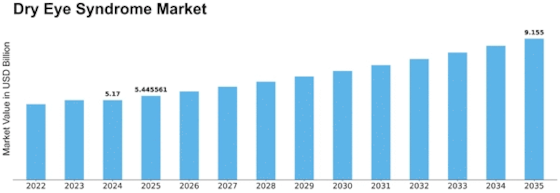


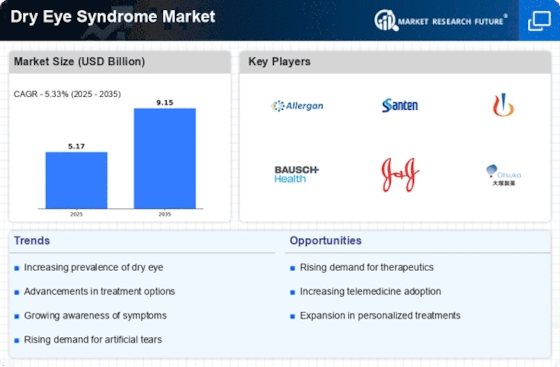
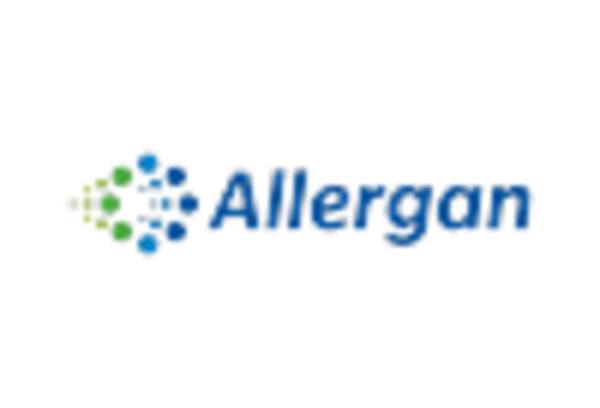
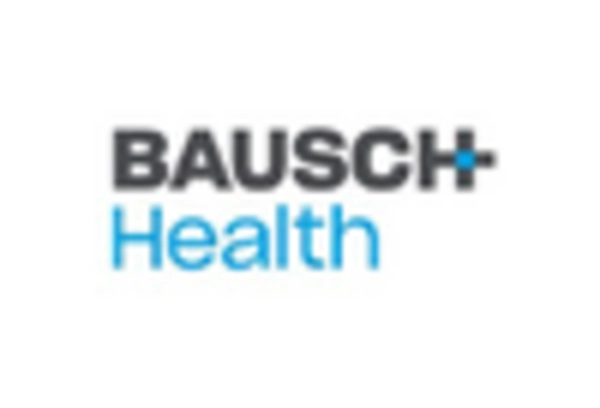


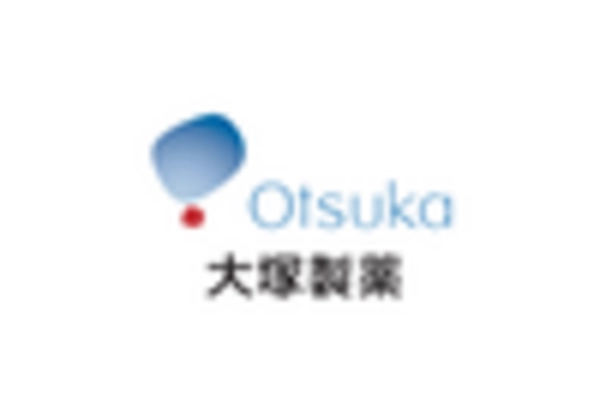
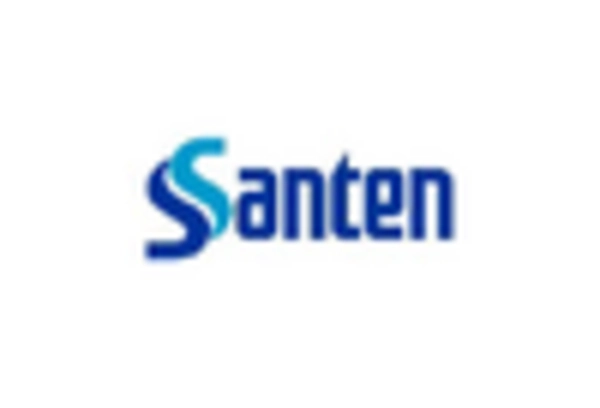









Leave a Comment